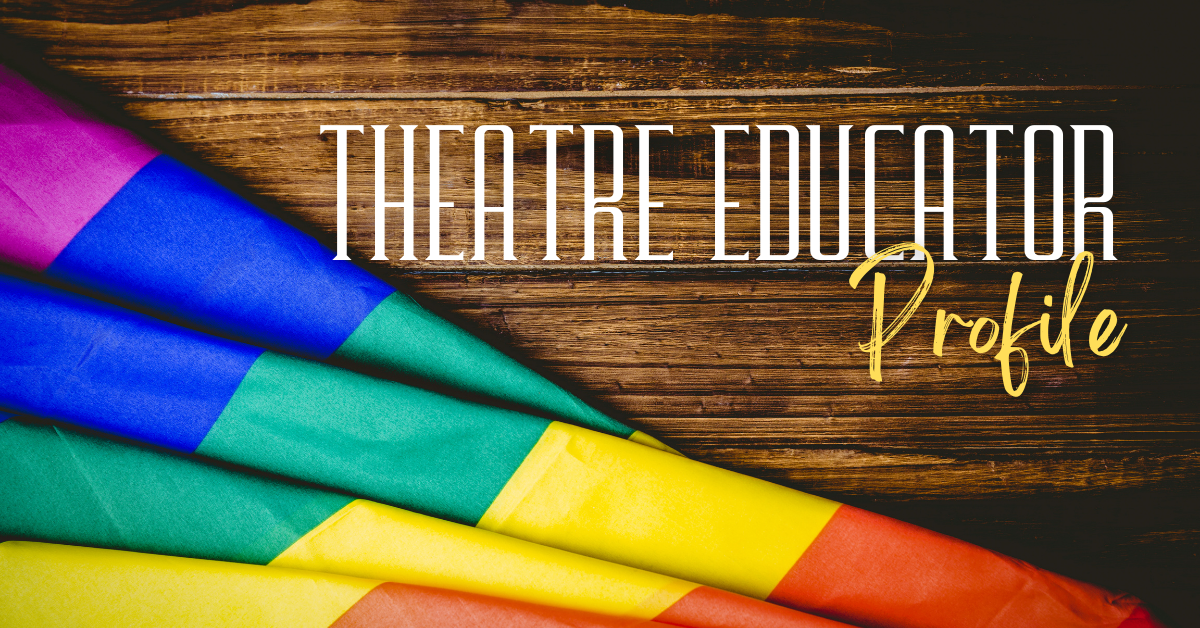Theatre Educator Profile: Michelle
At Theatrefolk, we celebrate the theatre educators who share their stories and continue to make their classrooms and stages a warm and wonderful place for all students.
Michelle (she/her) has been an out and proud middle-school theatre teacher in Wake County, North Carolina since 2014. She acts as an advocate for diverse students through her work on the school Equity team and as an advisor to the student-led SAGA (Sexuality And Gender Alliance) group. At home, she enjoys spending time as a single mom with her 4 year old (AMAB) son, and as a partner to her girlfriend.
1. What was it like for you as an LGBTQ+ teen?
Growing up I had no idea I was different in any way other than being the weird theatre kid. I assumed because I wasn’t interested in boys my age that I was just more mature than them. Also, I thought I was being realistic about the future, or lack thereof, a high school relationship would have. Coming from a smaller town, there was zero representation from adults in my schools, and the familial adults in my life grew up in a time when, if you did identify as queer, and even if everyone knew it, it just wasn’t talked about. So when I did finally realize my attraction to the (predominantly) same-sex, it was a bit shocking, not only to the people around me, but to myself as well. It made life more challenging in some ways, but it also made a lot of sense. Even at a young age, I was the kid in the room challenging my Sunday school teacher about why LGBTQ+ people weren’t going to get into heaven, not to mention many other seemingly-divisive moral code’s handed down to me through the adults in my life. It was lonely not realizing the part of my identity that has now helped me to connect more fully as a person, not only to a welcoming community, but also to the people in my life with whom I have experienced love.
2. What’s important to you in terms of supporting LGBTQ+ teens today in your classroom?
My number one goal in my class is to make sure that every student who enters my room can find a space that is welcoming, different, and safe. I want student’s to feel as if they have an adult in their world that can act as an advocate and support system, and who is a role model for LGBTQ+ kids so that they can see a future as an out and proud adult living and working in the world. Too many queer students find themselves trapped in a cycle where they think the trauma they are experiencing now, when they have little control over their lives, will never end. And because of that, they self-harm or worse. They have no idea that it actually can get better. I want to be the catalyst for positive change in the potential of every student. If I can help one student through as they explore identities, I feel like I’ve done my job.
3. What is one thing you’d like to change in the drama classroom in terms of LGBTQ+
I would love to see more mainstream shows have the ability for characters to be either gender or gender non-conforming, without it being all about that character. “Normalizing” queer characters in every story being told would be a huge step in visibility within the theatre community and the public at large. Having a character’s gender not matter enough to the storyline to make a huge difference if it can be the director’s choice from school to school. Not that I don’t love queer-centered stories, but I think we rely on them too heavily to be the only source that fills the “diversity” quota in theatre. Queer-centered stories are still very important towards understanding the lives of LGBTQ+ people, but unless we can integrate them into all stories without a second-thought, we’ve not completed all our goals. Students struggle with seeing themselves as character’s in a show, which makes them hesitate to audition for roles. Or they would like to change a character’s gender to align with their own, but are unsure if the director would be open to the idea. These dilemmas often exclude, by their own choice sometimes, students from participating in theatre when they otherwise might have.
4. What is something you want to share with teachers who have LGBTQ+ students
I want to be blunt: It isn’t about you. Let me repeat: It isn’t about YOU. Your personal ideas or opinions on identity and sexual preference should not influence your ability to embrace and connect to every child who walks through your classroom door. Please stop equating gender and sexual preference with sex. It’s not “inappropriate” to talk about, and by making it seem that way, you are potentially harming many students. Student’s know who they are and who they want to love, and for those student’s still exploring aspects of their identity, the dismissal of these things can make it that much harder for them to accept and embrace themselves. And taking it a step further, you have kids who do not identify anywhere within the LGBTQ+ community who have family members, moms, dads, siblings, cousins, who do fall somewhere in that spectrum. No one is asking you to publicly announce your support in a huge parade. You can disagree with the concept without disparaging students’ identities and families. Because it isn’t about you. It’s about helping young people grow into responsible, moral humans for our future.



